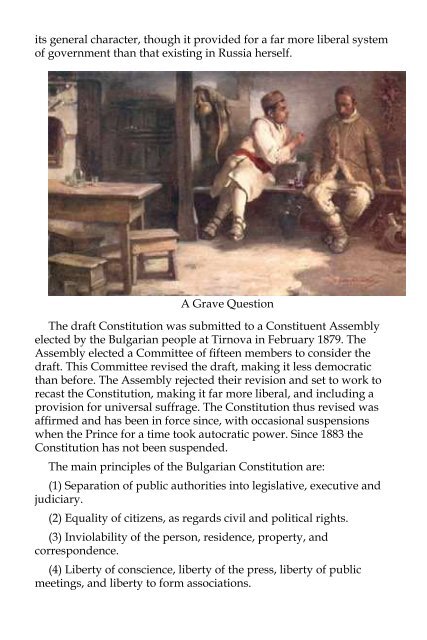Bulgaria e-book - iMedia
Bulgaria e-book - iMedia
Bulgaria e-book - iMedia
Create successful ePaper yourself
Turn your PDF publications into a flip-book with our unique Google optimized e-Paper software.
its general character, though it provided for a far more liberal system<br />
of government than that existing in Russia herself.<br />
A Grave Question<br />
The draft Constitution was submitted to a Constituent Assembly<br />
elected by the <strong>Bulgaria</strong>n people at Tirnova in February 1879. The<br />
Assembly elected a Committee of fifteen members to consider the<br />
draft. This Committee revised the draft, making it less democratic<br />
than before. The Assembly rejected their revision and set to work to<br />
recast the Constitution, making it far more liberal, and including a<br />
provision for universal suffrage. The Constitution thus revised was<br />
affirmed and has been in force since, with occasional suspensions<br />
when the Prince for a time took autocratic power. Since 1883 the<br />
Constitution has not been suspended.<br />
The main principles of the <strong>Bulgaria</strong>n Constitution are:<br />
(1) Separation of public authorities into legislative, executive and<br />
judiciary.<br />
(2) Equality of citizens, as regards civil and political rights.<br />
(3) Inviolability of the person, residence, property, and<br />
correspondence.<br />
(4) Liberty of conscience, liberty of the press, liberty of public<br />
meetings, and liberty to form associations.<br />
(5) Direct and secret universal suffrage for the election of members<br />
of the National Assembly, and departmental and municipal councils.<br />
(6) Local self-government.<br />
The authorities under the constitution are:<br />
1. The king, who is head of the army and navy, has the supreme<br />
executive power and can appoint and dismiss ministers, can<br />
prorogue Parliament but not for longer than two months, and can<br />
dissolve Parliament. The King may issue regulations and order<br />
measures, having the obligatory force of laws, whenever the State<br />
is threatened with immediate internal or external danger. All such<br />
measures, however, must be adopted by the Cabinet Council, and<br />
entail the collective responsibility of all the ministers. They must be<br />
submitted to the approval of the National Assembly in the course<br />
of its earliest session. A special section of the Constitution expressly<br />
forbids the levying, by means of such extraordinary regulations, of<br />
new taxes or duties, the National Assembly having alone the right to<br />
impose them.<br />
2. The National Assembly, elected by manhood suffrage through<br />
a secret ballot. Every deputy has the right to make propositions<br />
and to introduce bills, if he is supported by one-fourth of the<br />
members present. The National Assembly may amend the bills and<br />
propositions introduced by the Government. The deputies have the<br />
right to make interpellations. By means of this, the deputies can force<br />
individual ministers or the entire Government to explain their line<br />
of conduct and to state their intentions on some special matter, or as<br />
regards their general policy. The National Assembly may appoint<br />
commissions of inquiry or institute inquiries as regards the conduct<br />
of the Government. It may submit to the Crown special addresses.<br />
There is no Upper House, but for special occasions a “Grand<br />
National Assembly” is convoked. This has the same composition as<br />
the ordinary National Assembly, and its members are elected in the<br />
same way. The only difference between the two is that the number of<br />
members of a Grand National Assembly is twice that of the ordinary<br />
National Assembly, every electoral unit of 20,000 inhabitants sending<br />
two deputies instead of one. The Grand National Assembly may<br />
decide only those matters which have necessitated its convocation. A<br />
Grand National Assembly is called in the following cases:<br />
1. To decide questions of exchanging or ceding a portion of the<br />
territory of <strong>Bulgaria</strong>.





